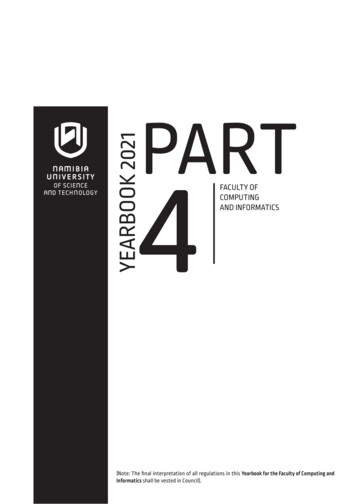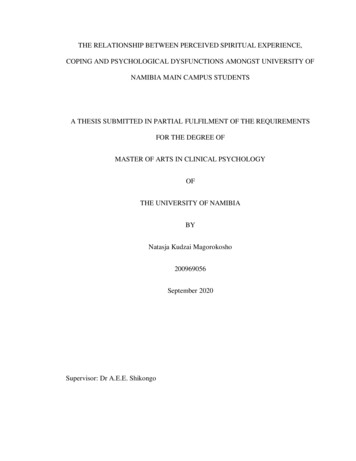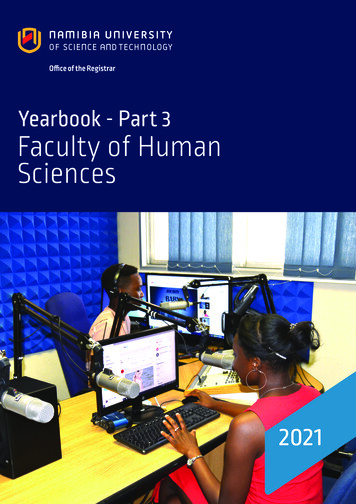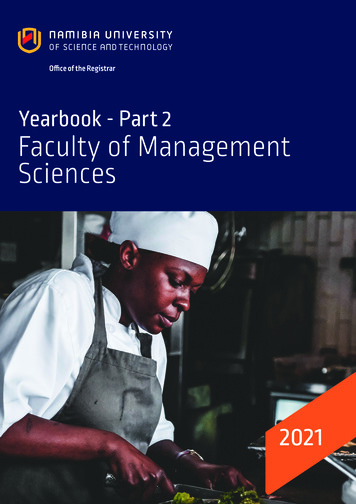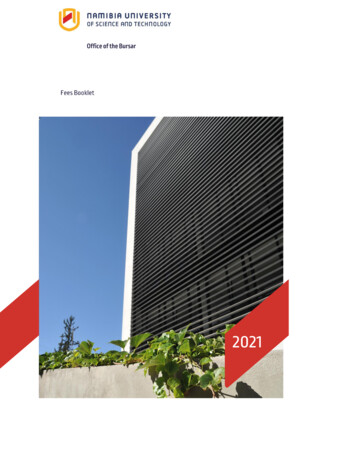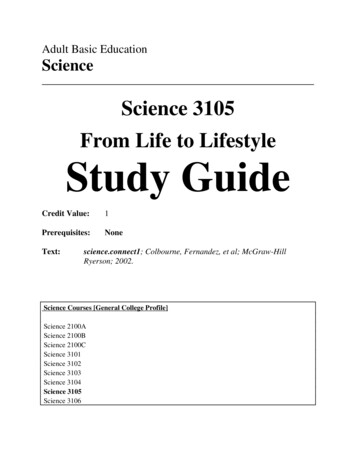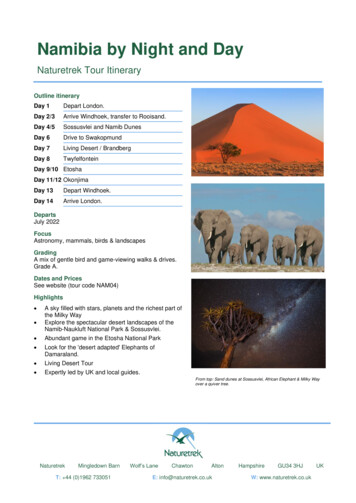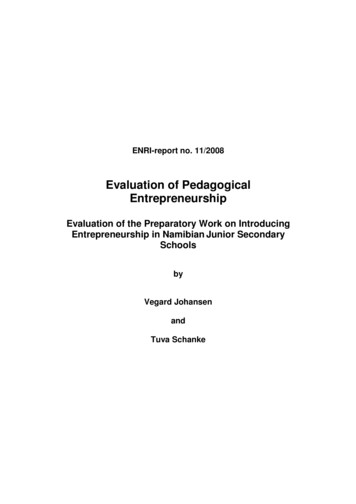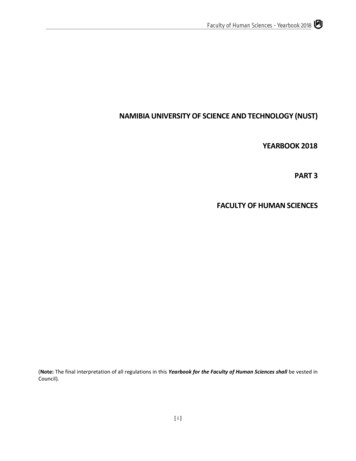
Transcription
NAMIBIA UNIVERSITY OF SCIENCE AND TECHNOLOGY (NUST)YEARBOOK 2018PART 3FACULTY OF HUMAN SCIENCES(Note: The final interpretation of all regulations in this Yearbook for the Faculty of Human Sciences shall be vested inCouncil).[i]
NOTEThe Yearbook for the Faculty of Human Sciences is valid for 2018 only. Curricula and syllabi may be amended for2019.It is obtainable free of charge from:The RegistrarNamibia University of Science and TechnologyPrivate Bag 13388WindhoekNAMIBIALocation:13 Storch Street, WindhoekTelephone:( 264-61) 207 2008 / 2118Fax:( 264-61) 207 hough the information contained in this Yearbook has been compiled as accurately as possible. Council and Senateaccept no responsibility for any errors and omissions, which may occur. The Namibia University of Science andTechnology retains the right to amend regulations or conditions without prior notice.Due to the rapidly changing external environment that many programmes operate in, and the Namibia University ofScience and Technology’s desire to remain constantly relevant in its offerings, some programmes may be significantlyamended after publication of this Yearbook. Please consult our website for the latest versions of our curricula, syllabiand academic regulations.The fact that particulars of a specific programme, field of study, subject, or course have been included in thisYearbook does not necessarily mean that such a programme, field of study, subject, or course will be offered in theacademic year 2018. Namibia University of Science and Technology/Office of the Registrar.[ ii ]
CONTACT DETAILSCentral Administration and Lecturers’ OfficesPostal Address:Private Bag 13388, Windhoek, NAMIBIAStreet Address:13 Storch Street, Windhoek, NAMIBIAStudent post to:Private Bag 13388, Windhoek, ENTRE FOR OPEN AND LIFELONG LEARNINGPostal Address:Private Bag 13388, Windhoek, NAMIBIAStreet Address:13 Storch Street, Windhoek, NAMIBIATel:207 2081/2206Fax:207 EPHONE NUMBERSNUST Switchboard Operator:207 9111Office of the Vice Chancellor:Vice ChancellorDeputy Vice Chancellor: Administration and FinanceDeputy Vice Chancellor: Academic Affairs207 2000/1-3207 2004/5207 2280/1Office of the Registrar:RegistrarAssistant Registrar: Academic AdministrationExaminations OfficeStudent Enquiries, Registrations, and Records207 2008/2118207 2351/2667207 2027/2412207 2056Office of the Bursar:Bursar207 2007Department of Student Services: DirectorStudents CouncillorCultural DepartmentSports Department207 2165207 2270207 2070207 2298Students Representative Council:Information & Communications Technology: DirectorLibrary & Information Services: Library, Enquiries and Loan CounterHostels:Men: Shangri-LaSuperintendentHouse CommitteeCall Office207 2457207 2275207 2022/2621Ladies: Mon ResaHouse CommitteeCall OfficeLadies: HöpkerHouse Committee207 2131207 2127229405/234193/233100207 2131207 2130SuperintendentSuperintendentNB: The international code in all numbers is 264-61[ iii ]207 2132207 2375229413/233130
CONTENTSFACULTY OF HUMAN SCIENCESFACULTY CODE 2Pageiiiiiiv1NoteContact DetailsContentsStaffUNDERGRADUATE PROGRAMMESDepartment of CommunicationBachelor of Communication (Revised) (Phased in 2015)Bachelor of English (Revised) (Phased in 2015)Bachelor of English (Phasing out from 2015)Bachelor of Journalism and Media Technology (Revised) (Phased in 2015)Bachelor of Journalism and Communication Technology (Phasing out from 2015)559131520Department of Education and LanguagesInstitutional Core CoursesForeign LanguagesNational and Foreign Languages (Non-formal)Certificate in Vocational Education and Training: TrainerHigher Certificate in Vocational Education and Training: TrainerDiploma in Vocational Education and Training Management26262930313232Department of Social SciencesBachelor of Criminal Justice in Correctional Management (Phased in 2015)Bachelor of Criminal Justice (Correctional Management) (Phasing out from 2015 to 2019)Bachelor of Criminal Justice in PolicingBachelor of Criminal Justice (Policing) (Phasing out from 2015 to 2019)Bachelor of Public Management (Phased in 2015)Bachelor of Public Management (Phasing out from 2014 to 2019)35353943474953POSTGRADUATE PROGRAMMES55Department of CommunicationBachelor of English Honours (Revised) (Phased in 2015)Bachelor of Journalism and Media Technology Honours (Revised) (Phased in 2015)Bachelor of Communication Honours (Phased in 2015)Master of English and Applied Linguistics (MEAL) (Phasing in 2017)5555586163Department of Social SciencesBachelor of Criminal Justice Honours (Revised) (Phased in 2015)Bachelor of Public Management Honours (Revised) (Phased in 2015)656568[ iv ]
FACULTY OF HUMAN SCIENCESFACULTY CODE 2OFFICE OF THE DEANDean:Code 60Faculty OfficerTelephone NumberFax NumberE-mail AddressSecretaryTelephone NumberFax NumberE-mail Address::::::::Alinah Segobye, PhD (Cambridge), M.Phil. (Cambridge), PGDE (Univ. ofBotswana), BA (Univ. of Botswana)Gillian Feris, ND HRM (PoN)061-207-2160061-207-9160gferis@nust.naMarilyn Muinjo061-207 2325061-207 9325mmuinjo@nust.naDEPARTMENT OF COMMUNICATIONCode 11Head of Department (Acting): Rewai Makamani, PhD Phil-et Lit., M.A.F.L. and M.L.S.P. (UZ), B.A. (Hons) andGrad. Cert: Ed. (UZ), Ex. Cert: Humanitarian Project Mgmt. (UZ), Cert: ESP BestPractices (Oregon),Deputy Head of Department: VacantSecretary: Ndinelao PN Nghifimule, B. OMT (PoN)Telephone Number: 061-207-2890Fax Number: 061-207-2267E-mail Address: nnghifimule@nust.naLab/Studio Technician: François Andreas, Apple Cert: Help Desk (Apple Online Course), Ass. A Cert:Comptia Online CourseProject Officer: Nadia Meding, B. Journ. & Comm. Tech.Academic Staff: Tracy Grellmann, M.Phil. Sec. Lang. Studies (US), B.A., H.E.D (UNAM): Alexandra Tjiramanga, M.Phil. ELT (Karl Franzens), Cert: InstructionalSkills Workshop Trainer, HE (Brock), Cert: OET (London), Cert: Online Learning(Oregon): Alexander Brewis, M.Phil., B.A. (Hons), HED (US), Cert: OET (London): Sarala Krishnamurthy, PhD Stylistics & African Lit. (Bangalore), PG. Dip:Teaching of Engl., B.Sc., M.A. Engl., OET, (Institute of London): Juliet Pasi, B.A., B.A. Hons, Grad. Cert. Ed., M.A. (UZ), Cert. Bldg. TeachingSkills (Oregon): Niklaas Fredericks, PhD, MA, BA Hons., BA (UWC): Max Mhene, M.Phil. Sec. Lang. Studies (US), B.Ed. (UZ), Dipl. Text & Discourse(UZ), Cert. Ed. (UZ): Elva A. Gómez De Sibandze, ESL Cert. (Brigham Young Univ.), B.A. & M.A.Lang.& Literature (Univ. of Utah), PG Cert: Translation, Culture and Communication(University of KZN): Hugh Ellis, B.Journ. (Rhodes Univ.), M.A. Journ. & Media Studies (Rhodes Univ.): Perpetua Wanja Njuguna, BA: Comm. (USA), M.A.: Print Comm. (Kenya),M.Pub. Admin. (Harvard): Emily Brown, B.A., B.A. Hons. Comm. (UNISA), M.Sc. Journ./Mass Comm. (IowaState): Haileleul Z. Woldemariam, PhD (India), MA (India), BA Hons. (Ethiopia), Prof.Dip. in Teaching (Ethiopia), Prof Cert.: Research Meth. & Plan. (Germany), Prof.Cert.: Social Sc. Research Meth. (Ethiopia): Nkosinothando Mpofu, D.Phil. in Social Sc., M. Social Sciences inCommunication, PG Dip.: Media Mgmt., B. Applied Comm. Mgmt.: Anneli Nghikembua, MA: Linguistics & Applied Language Study, B. Hons.:English Leadership & Mgmt., B. Edu. (Eng. & Econ.)[1]
DEPARTMENT OF EDUCATION AND LANGUAGESHead of Department: Dr Leena Kloppers, PhD: E-Research & TEL (Lancaster Univ), MA Open Dist. &Flex. Learning (Univ. of London), B.Sc. Comp. Sc. & Stats. (UNAM)Deputy Head of Department: Juliet Eiseb, M.Phil. (Stell.), B.A., MA ICT Edu. (UCT), H.E.D. (UWC), B. Ed.Hons. (UPE), Building Teaching Skills through the interactive web (Oregon)Secretary: Erna Daniel, B. OMT (NUST), Dip.: Exec. Secr. (PoN)Telephone Number: 061 – 207 2443Fax Number: 061 – 207 9443Email Address: edaniel@nust.naSecretary: Maria M. Adank, Dip.: Office Admin. (Damelin)Telephone Number: 061 – 207 2050Fax Number: 061 – 207 9050Email Address: madank@nust.naFNL Administrative Assistant: Monica Mundjindi, B.Tech. HRM Hons (NUST), Dip.: Office Admin. (Damelin)Telephone Number: 061 – 207 2226Fax Number: 061 – 207 9226Email Address: mmundjindi@nust.naIT Technician: Kenneth Draghoender, Dipl. IT (PoN), B. Systems Admin & Netw. (PoN)Telephone Number: 061 - 207 2468Email Address: kdraghoender@nust.naAcademic Staff: Yolanda Lyamine, B.A. Engl. Hons. (PoN), PG Dip. ICC Cum Laude (US), PG Dip.Ed. (UNAM), B.A. (UNAM): Caleb Gwasira, M.Phil. (US), B.A. (UZ), Grad. C.E. (UZ), B.Ed. Hons. (UNAM): Elina Ithindi, M.Phil. in ICT in Ed. (UCT), M.A. (Warwick), B.A. (Wittenberg): Dr Hileni T.N. Frans, PhD (UNISA), M.Phil (EP), TESOL (Singapore), B.Engl.Hons. (PoN), B.Tech. (Pta Tech), Teaching Dipl. (Zam), Dipl. Dev. Studies (Zam): Benhardt Kauteza, B.Ed. (UNAM), Technician’s Dip.: Mechanical (Academy ofTertiary Edu.): Jesus Lasso Rey, MA Phil. Web Dev. For Linguistics (GER), M.A. Spanish(Salamanca), B.A. Spanish/Engl. Hons. (Salamanca), PG Cert. Ed. (Salamanca),Adv. Dip. Engl. (Burgos), Sworn Translator High Court of Namibia (Spanish/Engl.): Jemima Mungenga, M.Ed. (Monash Univ.), B.Ed. (UNAM): Julia Indongo, M.A.: English Studies (UNAM), B. Ed. Hons. (UNAM): Corne Botes, M.Phil (Stell), B.Ed. Hons. (Potch), H.E.D. (Potch), ND.: IT (OFSTech.): Emelda Ucham, M.A. English Studies (UNAM), M.A. Engl. Lang & Linguistics,B.A. Hons. (UNISA), B.A. (UNAM): Cecilia Sibalatani, M.A.: English (Univ. of Leicester), B.Engl. Hons. (PoN), B.A.Engl. (Solusi Univ.), PGDP: Second Language Studies (US): Alfeus Tjijoro, B.Engl. Hons. (PoN), B.A. (UNAM), PGDE: Jeanne Hunter, M. Phil. Sec. Lang. Studies (US), B.A., H.E.D. (US), B.Ed.(UNAM), Dip.: Ling. (Surrey Univ), Dip.: Transl. (UNISA): Tjara Kaputu, M.A. Literacy & Learning (UNAM), B. Engl. Hons. (PoN): Agreement Ndlovu, M.A. Lang. for Spec. Purpose, B.A. (Univ. of Zim), Dipl.:Ed. (Univ. of Zim): Beven Kamwi, M.A. in Engl. Studies (UNAM), B. Eng. Hons., B.Ed. (UNAM): Fikameni Salomo, M.A.: Engl. Studies (UNAM), B.Ed. Engl. Hons. (UNAM), Dip.Adult Ed. (UNAM): Lance P. Hauuanga, M.Ed. (UFS), B.Ed. Hons., PGDE (UFS), Higher Dip. Ed.(WCE): Annie E. du Preez, B.Ed. Hons. (UNAM), B.A. Hons., Clinical Psych. (UNAM),B.A. HED (Pta)[2]
::::::::DEPARTMENT OF SOCIAL SCIENCESHead of Department:SecretaryTelephone numberFax numberEmail address:Deputy Head of cademic Staff:::::Ivan G. Coerecius, B.Ed. (UNAM), N.T.C. 6 Power Eng. (RC Elliott Tech.College), Higher Dip. Edu.: Tech. Secondary (UCT), T3 ND Electr. Eng. (CPUT)Rejoice P.N. Quest, M.Ed. (UNAM), B. Ed. Mngt. (PU), HED (UNAM)Simon K. Mubiana, MBA (ESAMI), B.Sc. Tech. Ed. (Univ. of Maw), PG Cert.HED (NUST), Dipl. Mech.Eng. (NORTEC), Dipl. Ed. (TVTC), Cert. Pedaagog.(GFITD), Cert Pr. Man. (USB), Cert. MDS. (USB)Dr Godfrey M. Tubaundule, PhD Curr. Stud. (UFS), PG curr. Studies & Assess.(UFS), PG Dip. Monitoring & Eval. (US), Magister Dev. Studies (UFS), M. Soc.Sc. Teacher Edu. (Umae), Higher Dip. Teach. Edu. (Umea), B.A. Geo. & Ed.(UNAM), HED PG (UNAM)Ronald Karon, B. Hons. Bus. Comp. (PoN), B. Systems admin. & Networks(PoN), Dipl. IT (PoN)Matchwell Lizazi, B. BA (SBS), Dip.: IT, Cert. Mid-level Mgmt. (UNAM), Electr.Eng. Cert. (Pta West College)Teopolina Kanime, M.A. (TESOL), B. Eng. Hons.Andreas Kalimbo, B. Systems Admin. & Networks (PoN), Dipl. IT (PoN)Code 63Dr iur. Stefan Schulz, Doctor iuris Freiburg i.Br./Germany), 1st State Ex. Law(Saarbruecken), 2nd State Ex. Law (Zweibrucken)Henrey-idid Karobes061 – 207 2392061 – 207 9392hkarobes@nust.naBen Namabanda, M.Admin (UNAM), B.Econ (UNAM): Linda Shipiki, B.Ed (UNAM), B. Logistic & Supply Chain Mgmt. (PoN): Adv. Magda Saayman, B.Iuris. (UOFS), LL.B (UNISA): Mariette Hanekom, BA Hons Journ., LL.B (Stell.), Legal Practitioner to the HighCourt of Namibia and Supreme Court of SA (Cape of Good Hope Prov. Div.),Conveyancer and Notary, Sworn Translator of the High Court of Nam.(Engl./Afr.): Retha van Zyl, LL.M (UNISA), B.Sc. (Stell.), Dip: Ed. (UNAM), B.Proc., LegalPractitioner to the High Court of Namibia: Hiltrud von Alten, LL.B., B.A. (UCT), Legal Practitioner to the High Court ofNamibia: Emmy Musima Wabomba, LL.M (UNISA), B.Iuris LL.B (UNAM), LegalPractitioner to the High Court of Namibia: Stephnie de Villiers, LL.B, B.A. (Stell.), Legal Practitioner to the HighCourt of Namibia, Conveyancer: Dr Tuhafeni Helao, DPA (UNISA), MPA (UWC), B. Admin (UNAM), NDPA (PoN),Cert: Basic Police Training (Luiperd Valley Police College), Cert: Supervision &Man. (IPI Police College), NCPA, NHCPA: Eliphas !Owos-ôab, MPA (UNAM), B. Hons Criminal Justice, B.Tech.: Pub.Mgmt., NDPM (PoN), Adv. Int. Dip: TSM (Sweden), MDP Technikon Wits); ITO IIDip: Traffic Mgmt. (ITMPOSA): Dr Hennie Bruyns, D.Litt Et Phil: Penology (UNISA), MA: Penology (UNISA), BAHons: Penology & Criminology (UNISA), BA (Hons) HRD (RAU), BA: Criminology& Penology (UNISA): Bornface Siseho Konga, LL.B, B.Juris (UNAM): Dr Johan Coetzee, PhD BMA (USB), MBA Executive (USB), MA PublicAdministration (USB), Bus and Admin Hons (USB), BA Hons. PublicAdministration Cum Laude (USB), BA (USB)[3]
::::::::::John Mbenzi, MPPA (ISS Holland & UNAM), Dip: Pub. Admin. (PoN), B.Tech.:Pub. Mngt. (TSA), MPPA (ISS Holland & UNAM)Pia Teek, Masters in Pub. Mgmt. (Stell), Pub. Mngt. Hons Cum Laude,Helena Imene, M. Dev. Fin. (Stell), B.Tech. Pub. Mngt. (PoN), Cert: (ProjectMngt.) (Stell), ND: Pub. Mngt. (PoN),Manelia Shakela, M.Admin. (Flinders Univ. AUS), ND: Pub. Admin. (PoN),B.Tech.: Pub. Mngt. (PoN), ND: Pub. Admin. (PoN)Malakia Haimbodi, M. Public Admin. (UNAM), B. Hons. Pub. Admin., Dip.: LocalGovt. StudiesJackpelins Muundjua, B. Hons. Pub. Admin. (Stell.), B.Tech. Publ. Mgmt. (PoN),Cert.: Web Designing (UNQM), Cert. in Web Dev. & HTML (IIT)Bernhard Tjatjara, LL.B Hons. (UNAM), B. luris, Cert. of Comp. Law (Uni. ofLondon, SOAS)Pilisano H. Masake, LL.M (Stell.), LL.B (UNAM), B. Juris (UNAM), Cert. Adv.Crim. Investigation (IPIPC, Nam), Cert. Basic Crim. Investigation (IPIPC, Nam),Cert. Investigation of Transnational and Organised Intell. Property Crime(Interpol College, Zim.)Michelle Maree, M.Tech. Publ. Mgmt. (CPUT), BA Hons.: Publ. & Dev. Mgmt.(Stell.), BA (Stell.)Frederich Koita, M.Sc. Publ. Admin. & Dev. (UK), B. Hons.: Publ. Admin. (UWC),BA (UWC)[4]
UNDERGRADUATE PROGRAMMESDEPARTMENT OF COMMUNICATIONQUALIFICATIONS OFFEREDBachelor of Communication (Revised) (Phased in 2015)Bachelor of English (Revised) (Phased in 2015)Bachelor of English (Phasing out from 2015)Bachelor of Journalism and Media Technology (Phased in 2015)Bachelor of Journalism and Communication Technology (Phasing out from 2015)BACHELOR OF COMMUNICATION(Revised Programme) (Phased in 2015)NQF Level: 707BACO07BAEN25BAEN07BJMT25BJCT07BACONQF Credits: 370NQF Qualification ID: Q0735DescriptionThe Bachelor of Communication has been revised to ensure its continued relevance, as well as full compliance withthe Curriculum Framework and National Qualifications Framework (NQF) requirements. This revised programmeaddresses the ongoing need for qualified communicators in both the public and private sectors.Admission RequirementsCandidates will be considered for admission to this programme, if they meet the General Admission Requirementsof the Namibia University of Science and Technology (NUST) (GI2.1 in Part 1 of the NUST Yearbook). In additionto General Admission Requirements (Regulation GI2.1) and Mature Age Entry Scheme (Regulation GI2.2) ascontained in the N U S T Yearbook, candidates should have a minimum D- symbol in Grade 12/NSSCO English.Candidates who meet the minimum admission requirements will be required to write a special Final SelectionEnglish test (not a placement test) which they should pass with at least 50 % to be considered for admission intothe programme. Admission under Mature Age Entry Scheme shall also consider recognition of prior learning (RPL).Articulation ArrangementsTransfer of credits will be dealt with according to the University’s regulations on Recognition of Prior Learning.These provide for course-by-course credits as well as credit transfer by volume under certain academic conditions.Maximum credit that could be granted is 50 % of the credits for a qualification.Students who graduate with the Bachelor of Communication will ordinarily be able to pursue further studies inCommunication, or a related area of cognate learning at NQF Level 8.Mode of DeliveryThis programme will be offered on the full-time, part-time and distance modes of study, in accordance with NUSTrules and regulations.Requirements for Qualification AwardThe Bachelor of Communication will be awarded to students credited with a minimum of 370 credits. In addition,students should meet the administrative and financial requirements spelt out in Part 1 of the Namibia Universityof Science and Technology Yearbook.[5]
CURRICULUMYear 1Semester 1Course CodeCourse 1SIntroduction to Communication 1AIntercultural CommunicationPrinciples of MicroeconomicsBasic MathematicsComputer User SkillsNoneNoneNoneNoneNoneSemester 2ICO521SOCO521SNVC521SICT521SBSC410SIntroduction to Communication 1BOrganisational CommunicationNonverbal CommunicationInformation CompetenceBasic ScienceRhetorical Theory and CriticismSpecialised WritingGroup Dynamics andCommunicationIntroduction to SociologyIntroduction to Public ManagementYear 2Semester FCredit12121212Introduction to Communication 1AIntroduction to Communication 1ANoneNoneNone55554121212108NoneOrganisational CommunicationNone666131313NoneNone551212Semester 4GCO621SGender CommunicationNone615WCO621SWeb CommunicationInformation Competenceand Specialised Writing613PSA621SPublic Speaking and ArgumentationRhetorical Theory and Criticism613PRT721SIPS521SPublic Relations Theory and PracticeIntroduction to Political ScienceNoneNone751412Year 3Semester 5WIC711SWork Integrated LearningAll core courses in Communication up toSemester 4.760NoneNone671214MCO721SPAP721SContemporary IssuesLegal and Ethical Issues inCommunicationManagement CommunicationPersuasion and Propaganda771414MCM721SMediation CommunicationNoneRhetorical Theory and Criticism; andPublic Speaking and ArgumentationNone714Semester 6CIS610SLEC721S[6]
Assessment StrategiesStudents will be assessed through continuous and summative assessment. These assessments will focus on theachievement of qualification outcomes and take the form of problem-solving exercises, individual or groupassignments and presentations, case studies, report writing, practical application of skills and competencies,tutorials, practical projects and questioning (tests and/or examinations). The use of validating end-of-termassessments may be minimised in order to free students’ intellectual capacity for broader cognitive development.Assessment by means of tests and/or examinations will, therefore, be restricted to situations where it isnecessary to establish that a previous specific performance can be repeated or a specific skill can be transferred.In accordance with University policy on diversified continuous assessment, each course, where applicable, will havea minimum of six assessment events. Courses that are assessed using a combination of continuous assessment anda final end-of-semester examination will have at least four formal assessments.The Work Integrated Learning component which, for a semester, requires a portfolio to be compiled by thestudent, is monitored by lecturers and requires supervisor input. Continuous Assessment is done at the end of thesemester by an external moderator for WIL.Transition ArrangementsThe Bachelor of Communication (old curriculum) will be phased out systematically until 2017, with minimaldisruption to existing students’ learning progression. The last intake of 1st year students for the out-phasingprogramme (old curriculum) was in January 2014.Students who were registered in 2014 for the 1st year of the out-phasing programme (old curriculum), and whofailed more than 50 % of the courses at the end of the year, will be required to change their registration to therevised programme (new curriculum), and will be granted credits on a course-by-course basis in accordance withinformation in Table 1 below.In addition, students who are registered in 2014 for the 1st year of the out-phasing programme (old curriculum),and who met all requirements for progression to the 2nd year in 2015, will also be required to transition to therevised programme (new curriculum) but will need exemption from two of the institutional core courses, i.e.Information Competence (ICT521S), and Basic Science (BSC410S). All other courses will be credited in accordancewith information in Table 1 below.However, students who were registered for the 3rd year of the out-phasing programme (old curriculum) in 2015will be allowed to complete the programme based on the requirements of the old curriculum, as they stand to losecredits. They would have until 2019 to do so.The revised Bachelor of Communication (new curriculum) will take effect from January 2015 with concurrentimplementation of the 1st and 2nd year (2015), while implementation of the 3rd year is scheduled for 2016. Courseswill only be offered based on the new and revised syllabi in 2015 (1st and 2nd year) and 2016 (3rd year). Students whoare admitted into the examination, but fail any of the courses on the old curriculum will only be granted twoopportunities to pass such courses in accordance with University rules. The 3rd year students who fail any of thecourses on the old curriculum will be required to repeat the failed courses based on syllabi of new and revisedcorresponding courses. Please refer to the table below, for detailed information on the new/revisedcorresponding courses to be done if courses on the old curriculum are failed.The deadline for the complete phasing out of the Bachelor of Communication (old curriculum) is 2019, after whichstudents must automatically switch to the new programme and fulfill all requirements based on the newcurriculum.[7]
Year 1: Courses to be credited:CourseBachelor of CommunicationCode(Old NVC112SOCO112SGDC212SGCO212SIntroduction to Communication 1AIntercultural CommunicationBasic MathematicsComputer User SkillsPrinciples of MicroeconomicsIntroduction to Communication 1BNonverbal CommunicationOrganisational CommunicationGroup Dynamics and CommunicationGender CommunicationCorresponding Courses (if Failed). This is not a credit table.CourseBachelor of CommunicationCode(Old Courses)ICO111SIntroduction to Communication 1AICC111SIntercultural CommunicationICO112SIntroduction to Communication 1BNVC112SNonverbal CommunicationOCO112SOrganisational CommunicationGDC212SGroup Dynamics and CommunicationGCO212SGender CommunicationRTC211SRhetorical Theory and CriticismWCO211SWeb CommunicationSPW212SSpecialised WritingPSA212SPublic Speaking and ArgumentationWIL311SWork Integrated LearningLEC312SLegal and Ethical Issues in t CommunicationPersuasion and PropagandaMediation CommunicationRhetoric of Constitutional DiscourseCourseCodeBachelor of Communication(Equivalent New/Revised NVC521SOCO521SGDC611SGCO621SIntroduction to Communication 1AIntercultural CommunicationBasic MathematicsComputer User SkillsPrinciples of MicroeconomicsIntroduction to Communication 1BNonverbal CommunicationOrganisational CommunicationGroup Dynamics and CommunicationGender WIC711SLEC721SBachelor of Communication(Equivalent New/Revised Courses)Introduction to Communication 1AIntercultural CommunicationIntroduction to Communication 1BNonverbal CommunicationOrganisational CommunicationGroup Dynamics and CommunicationGender CommunicationRhetorical Theory and CriticismWeb CommunicationSpecialised WritingPublic Speaking and ArgumentationWork Integrated LearningLegal and Ethical Issues in CommunicationMCO721SPAP721SMCM721SManagement CommunicationPersuasion and PropagandaMediation CommunicationNB: RCD312S - Course was anelective that has never run and has nowbeen removed in the revised syllabus.Please Note:The second Table above only highlights new and revised core courses in Communication that should be done ifcourses in the Bachelor of Communication out-phasing programme (old curriculum) are failed. The institutional corecourses and service courses from other departments are excluded, but the rules of relevant departments apply to thisprogramme as well.There are no courses in the out-phasing programme (old curriculum) that do not have corresponding courses in thenew curriculum. It is noteworthy that the relevant old curriculum service courses from other departments, as listedbelow, are still in place and, therefore, still on offer to the Bachelor of Communication students: Introduction to Marketing and its Environment (IME511S) International Relations and Organisations (IRO311S)[8]
BACHELOR OF ENGLISH(Revised Programme) (Phased in 2015)NQF Level: 707BAENNQF Credits: 377NQF Qualification ID: Q0734DescriptionThe revised Bachelor of English programme provides state of the art education insofar as English is concerned byincorporating digital literature and digital technologies into the traditional subject matter.The programme is fully compliant with requirements of the National Qualifications Framework (NQF) and theUniversity’s Curriculum Framework.Admission CriteriaCandidates may be admitted to the Bachelor of English Degree programme if they meet the University’s GeneralAdmission Requirements (GI2.1 in Part 1 of the Yearbook). In addition to General Admission Requirements(Regulation GI2.1) and Mature Age Entry Scheme (Regulation GI2.2) as contained in the Yearbook of NamibiaUniversity of Science and Technology, students shall have symbol D or better in English.Students will be required to write a special English test (not placement test) which they should pass with at least60 % to be admitted into the programme. Admission under Mature Age Entry Scheme shall also considerrecognition of Prior Learning (RPL).Articulation ArrangementsTransfer of credits will be dealt with according to the University’s regulations on Recognition of Prior Learning.These provide for course-by-course credits as well as credit transfer by volume under certain academic conditions.Maximum credit that can be granted is 50 % of the credits for a qualification.Students who complete the Bachelor of English successfully will ordinarily be able to pursue further studies inEnglish or a related cognate area of learning, at NQF level 8.Mode of DeliveryThe intention is to offer the programme on the full-time, part-time and distance modes of study in accordance withthe University rules and regulations.Requirements for Qualification AwardThe Bachelor of English degree will be awarded to students credited with a minimum of 377 NQF credits. Inaddition, students should meet the administrative and financial requirements as spelt out in Part 1 of the NUSTYearbook.CURRICULUMYear 1Semester 1Course Code Course 11SNoneNoneNoneNoneNoneIntroduction to LinguisticsIntroduction to Literature1ALanguage and TechnologyComputer User SkillsBasic Mathematics[9]NQFLevel55544NQFCredits1212121012
Semester 2IPP521SIntroduction to Phonetics andPhonologyIntroduction to Linguistics; andLanguage and Technology512ILT521SNLI521SIDL521SIntroduction to Literature 1BNamibian LiteratureIntroduction to Digital LiteratureNoneIntroduction to Literature 1AComputer User Skills555121212BSC410SBasic ScienceNone48ICT521SInformation CompetenceNone510Year 2Semester 3EMP511SEnglish Morphology512TPP611SIntroduction to Linguistics; andIntroduction to Phonetics and PhonologyTheory and Practice of World Poetry 2A None612LTD611SESY611SICC511SLiterary DramaEnglish SyntaxIntercultural CommunicationNoneNoneNone665121212Semester 4SOS721STPP621SLRC621SLTP621SRTC621SStudy of SemanticsTheory and Practice of World Poetry 2BLiterary CriticismLiterary ProseRhetorical Theory and CriticismNoneTheory and Practice of World Poetry 2ANoneNoneNone766661412121213Year 3Semester 5EDP711SEnglish Digital Project714WIE711SWork Integrated LearningIntroduction to Digital Humanities;Language and TechnologyAll core courses up to semester 4748Semester 6SAL721SSLA721SAFL721SMCO721SCIS610SSouthern African LiteratureSecond Language AcquisitionAfrican LiteratureManagement CommunicationContemporary IssuesAll courses up to Semester 4NoneAll courses up to Semester 4NoneNone777761414141412Assessment StrategiesStudents will be assessed through continuous and summative assessment. These assessments will focus on theachievement of qualification outcomes and take the form of problem-solving exercises, individual/groupassignments and presentations, case studies, report writing, practical application of skills and competencies,tutorials, practical projects and tests and/or examinations. The use of validating end of term assignments may beminimised in order to free students’ intellectual capacity for broader cognitive development. Assessment bymeans of tests and/or examinations will, therefore, be restricted to situations where it is necessary to establishthat a previous specific performance can be repeated or a specific skill can be transferred. In accordance with theUniversity policy on diversified continuous assessment, each course will have a minimum of six assessment events.[ 10 ]
Courses that are assessed using a combination of continuous assessment and a final end-of-semester examinationmust have at least three assessments.Work Integrated Learning (WIL) will be assessed on the basis of the following: WIL (Industry) supervisor’s report; Academic assessor’s mark (academic assessor to int
[ iii ] CONTACT DETAILS Central Administration and Lecturers' Offices Postal Address: Private Bag 13388, Windhoek, NAMIBIA Street Address: 13 Storch Street, Windhoek, NAMIBIA Student post to: Private Bag 13388, Windhoek, NAMIBIA Website: www.nust.na Email: registrar@nust.na CENTRE FOR OPEN AND LIFELONG LEARNING
